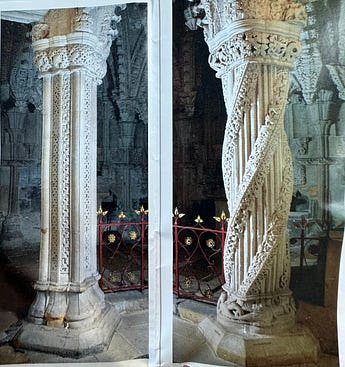Would You Die for Your Life’s Work?
There’s a 500-year-old chapel outside of Edinburgh in Scotland that’s rumored to be the burial site of the Knights Templar and the Holy Grail. Dan Brown featured Rosslyn Chapel in his 80-million-copy book, The Da Vinci Code. A stonemason even gave his life building the chapel.
Legend says the master stonemason went abroad seeking inspiration to create a column worthy of the chapel. While the master traveled, the apprentice had a vision for a column that he created in the years while the master was away. The apprentice’s column was beautiful. More beautiful than the master’s.

Rosslyn Chapel: The master’s column on left, the apprentice’s on right
When the master saw the apprentice’s column, he flew into a fit of rage and killed the apprentice with a mallet. The apprentice did his life’s work and lost his life for it.
My wife and I visited the chapel this past week, and I couldn’t help but think about the stonemason giving his life for doing his best work. His life’s work is now immortalized in stone and story.
The idea of doing your “life’s work” has become almost a meme in the venture capital world. Every VC wants to invest in entrepreneurs doing their life’s work (us included). Who wouldn’t want to invest in someone doing what they were put on earth to do? Doing your life’s work grants you superpowers to sell, persist, and persevere, all qualities necessary for an entrepreneur’s success.
The masons of Rosslyn spent 40 years doing their life’s work, but the chapel’s enduring grandeur against hundreds of years of harsh Scottish weather makes me think about what exists beyond a life’s work: Timeless work.
True, Beautiful, Simple
A life’s work is powerful, but a timeless work is immortal. Immortality is something no human can have, which is why timeless work is so profound. It outlasts our mortality. Timeless work is determined by unwritten history. Only survival of time guarantees something to be timeless, and we of current time can’t accurately judge what will survive the future.
A life’s work is found through obsession. If you find something you love doing and can’t stop thinking about, it’s probably your life’s work. All timeless work is the labor of a life’s work, but merely working on an obsession doesn’t guarantee timelessness. It only creates the necessary conditions for it.
What then makes a work timeless?
A timeless work must be durable. Durability allows a thing to withstand the natural decay caused by time. It may come from a literal durability like the stonework of Rosslyn Chapel, or it may come from an intangible durability like that of a profound idea. A timeless thing doesn’t change. That’s the nature of timelessness. The thing’s existence literally endures the test of time.
Durability in both cases is built on the marriage of three things: truth, beauty, and simplicity.
Truth is honest because it cannot be false, so truth is undeniable and unavoidable. Untruth is destined to decay because it requires a defense from the confused or malicious. Truth defends itself naturally, and that makes truth the most durable thing of all.
Simplicity is not unavoidable like truth. It’s all too easily avoided in favor of complexity. Complexity makes things fragile by virtue of needing gentle care much like untruth. The world is not gentle, so gentle things do not survive it. Simplicity is durable because it eliminates the extraneous, and the fewer extraneous complexities, the closer something must be to truth.
Beauty is undeniable. It’s an innate quality that demands to be remembered and appreciated like the truth. Plainness begs to be forgotten. Ugliness demands to be reviled like untruth. Anything that can persist through the natural entropy of the world must be beautiful. The truth is always beautiful, and so is simplicity.
Timeless Work in the AI Age
A 500-year-old stone column has a natural timelessness about it. Physical things that defy the erosion of age can’t help but earn admiration. It’s why we visit old chapels, collect old cars, and even respect old people.
The same qualities that make physical things timeless make digital things timeless too — truth, simplicity, and beauty. The difference is that bits don’t age like atoms in the literal sense. Bits are merely information. Information represents ideas, and ideas age faster than anything in the physical world.
AI will exacerbate the ephemeral nature of information, but it might also add a new wrinkle of making ideas dynamic rather than static.
Just before we visited Rosslyn, I read that China is experimenting with an AI model trained on President Xi’s philosophies. The AI seems meant to grant Xi’s ideas a sort of immortality, but does that make them timeless or something else?
That brings us back to truth, the ultimate test of durability. To the extent Xi’s ideas are true they would be timeless regardless of whether an AI existed to perpetuate them. To the extent Xi’s ideas are flawed, AI can grant them a life well beyond what would be natural through intelligent defense, perhaps a defense even better than Xi himself could give.
AI doesn’t have to be built on truth, but the challenge of time means an AI built on untruth should ultimately succumb to an AI built on truth. It may just take a long time, and that time could be bad for humanity.
Elon seems to understand this better than anyone. His advocacy for a “maximally truth seeking” AI is another way of saying a timeless AI. A maximally truth-seeking AI would be the most durable AI, and that might be the most timeless invention ever. Hopefully no stonemasons are harmed in timeless AI’s creation.